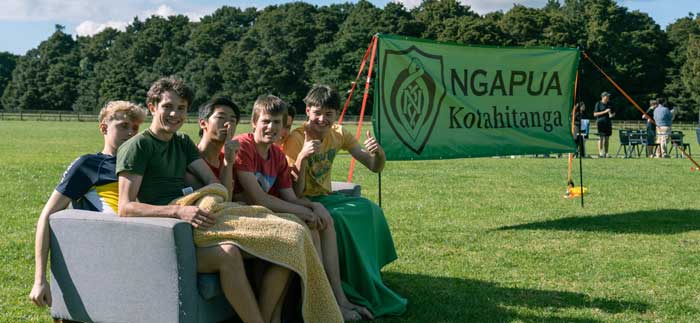Whānau Groups (College Houses)
Whānau Groups | Blake, Hillary, Ngāpua and Sheppard
The Whānau system is at the heart of the College. It is the foundation of our holistic approach to student education and well-being… a ‘family within a family’ where students are part of a smaller group of 80 students. On enrolment, students are placed in a whānau where they become part of an extended family of teachers and students of all year levels, and they remain in this whānau during their years at college, nurturing a sense of belonging. To facilitate this relationship, the college places siblings in the same whānau.
Huanui College has four Whānau Groups named after influential New Zealanders who exemplify the school motto “Vincit qui se vincit” – “He conquers who conquers himself”. The foundation students in 2010 chose the four New Zealanders that they respected, and wanted to honour by using their name. Those named: Sir Peter Blake, Sir Edmund Hillary, Hone Heke Ngāpua and Kate Sheppard.
Each whānau meet daily to participate in well-being activities that build social skills, promote self-esteem, teach problem-solving skills, aid with development of a growth mindset, empathy and the benefits of grit and resilience. By meeting every day, it also helps to build social connections and foster inclusion and participation. Also as part of our whānau system we have inter-whānau competitions and camps to help build school spirit.
Blake
To win, you have to believe you can do it. You have to be passionate about it. You have to really ‘want’ the result – even if this means years of work. The hardest part of any big project is to begin.
Sir Peter Blake was a New Zealand yachtsman who won the Whitbread Round the World Race, the Jules Verne Trophy – setting the fastest time around the world of 74 days 22 hours 17 minutes 22 seconds. He led his country to successive victories in the America’s Cup. Blake was appointed a Knight Commander of the Order of the British Empire in 1995. Sir Peter was made a United Nations Environment Programme Special Envoy for his environmental work.
- Whānau Leader: Jenny Strydom
- Whānau Prefects: Lexis Bracey and Sophie Theis
- Sports Captain: tbc
- Cultural Captain: tbc
- Academic Captain: tbc
- Media and Communications Captain: tbc
- Community Services Captain: tbc
Hillary
It’s not the mountain we conquer but ourselves.
Sir Edmund Hillary was a mountaineer, explorer and philanthropist. On 29 May 1953 at the age of 33, he and Sherpa mountaineer Tenzing Norgay became the first climbers known to have reached the summit of Mount Everest. Following his ascent of Everest he devoted much of his life to helping the Sherpa people of Nepal through the Himalayan Trust, which he founded.
- Whānau Leader: Beth Churcher
- Whānau Prefects: Mathilda Cloherty and Thomas Cutforth.
- Sports Captain: tbc
- Arts and Culture Captain: tbc
- Academic Captain: tbc
- Media and Communications Captain: tbc
- Community Services Captain: tbc
- Wellbeing Captain: tbc
Ngāpua
Kotahitanga: Oneness or Unity – we are greater together than we are of ourselves.
Hone Heke Ngāpua was a Liberal Party Member of Parliament in New Zealand and was influential in the development of the Young Maori Party. Ngāpua helped to defuse the conflict of the Dog Tax War of 1897. He introduced a Native Rights Bill, some of which was incorporated into legislation passed in 1900.
- Whānau Leader: Callum Mather
- Whānau Prefects: Clare McLeod and Baylee Trask.
- Senior Captain: tbc
- Intermediate Captain: tbc
- Junior Co-Captain: tbc
Sheppard
Try each day to improve both yourself and the world in any way no matter how small.
Kate Sheppard was the most prominent member of New Zealand’s women’s suffrage movement, and is the country’s most famous suffragette. As New Zealand was the first country to introduce universal suffrage, Sheppard’s work had a considerable impact on women’s suffrage movements in other countries.
- Whānau Leader: Guy Oclee-Brown
- Whānau Prefects: Anna Barradell and Laura Manning.
- Sports Captain: tbc
- Communications and Media Captain: tbc
- Cultural Captain: tbc
- Community Captain: tbc
- Academic Captain: tbc




